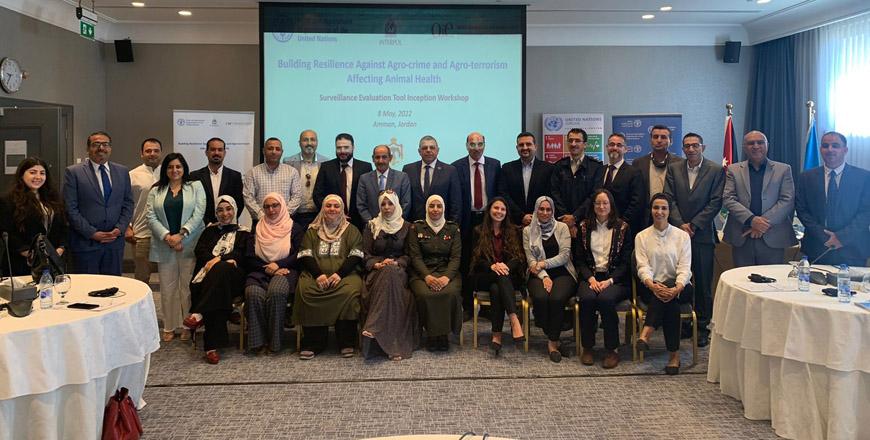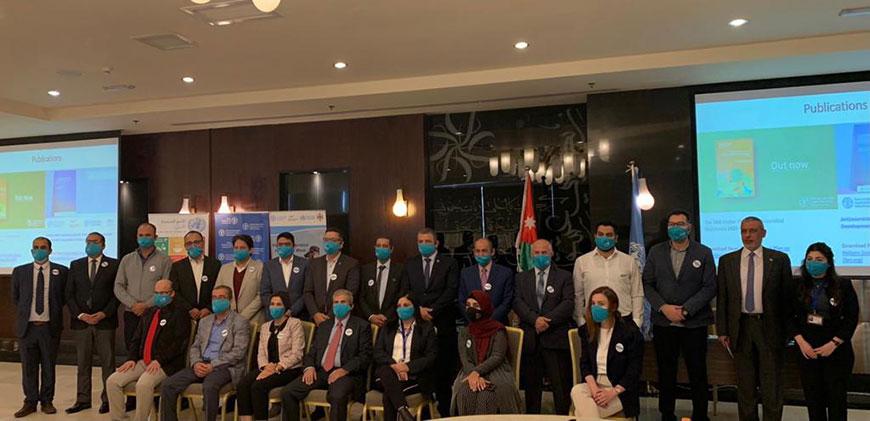You are here
Veterinary twinning project works to reduce threat of infectious diseases, strengthen biosecurity
By Ana V. Ibáñez Prieto - Apr 22,2018 - Last updated at Apr 22,2018
AMMAN — Dignitaries from the British embassy, the Jordan University of Science and Technology (JUST) and UK’s Royal Veterinary College (RVC) on Sunday celebrated with Higher Education Ministr Adel Tweisi the success of a joint programme aimed at reducing the threat from infectious diseases in the Middle East by improving public health.
Supported by the UK and the US, the project twinned JUST and the RVC three years ago, with the purpose of enhancing the delivery of veterinary education while fostering the collaboration between European and Middle Eastern scientific communities, and strengthening the Kingdom’s capacity to ensure biosecurity through a stronger regional disease surveillance.
“The Veterinary Education Twinning Programme is making a huge impact on JUST graduates and Jordan’s veterinary and public health sectors,” JUST professor Ehab Abu Basha said, expressing hopes for the platform to “transform veterinary education and improve public health not just in Jordan, but in the entire Middle East and the Arab world”.
The collaboration among both educational institutions is built on the framework of an international partnership programme comprising more than 30 countries, which aims to improve national capacities in detecting and controlling infectious diseases while strengthening biosecurity systems.
Managed by the World Organisation for Animal Health (OIE), the project has successfully developed teaching expertise at both institutions through mutual visits, research projects and integration with joint specialised workshops in different areas of veterinary medicine and biosecurity.
“This project is demonstrative of how the curriculum at JUST is developed to address priority topics such as public health, animal production and welfare,” OIE Director General Monique Eloit highlighted, adding that “the partnering of postgraduate students from RVC and JUST on research projects has furthermore enabled synergies to be optimised, and significant results to be yielded”.
OIE regional representative Ghazi Yehia pointed out that “this successful twinning has developed a continuous and sustainable link between parties; it has allowed them to develop better expertise and capacity in preserving animal health, and it will soon provide support and collaboration to other regional countries”.
Bruscellosis, an infectious disease that can spread from farm animals to humans, and Middle Eastern Respiratory Syndrome Coronavirus (MERS-CoV), which is believed to spread from camels to humans, are some of the biological risks addressed in the project, which aspires to tackle such threats while contributing to Jordan’s food security and ability to export animal products.
“In challenging times and an uncertain world, the RVC is committed to its global citizenship and international obligations. It has been a pleasure to translate this commitment to a reality, making impact in a domain that is pivotal to economic and social stability.” RVC professor Stuart Reid said.
For his part, British Ambassador Edward Oakden stressed the importance of the project, referring to the beginning of the “mad cow disease” spread in the UK back in the 1990s.
“I was working at the prime minister’s office when the mad cow disease started spreading, and I still remember the huge popular fear and cultural convulsion over the fact that the disease could spread to humans,” the ambassador recalled.
Related Articles
AMMAN — The Food and Agriculture Organisation of the United Nations (FAO) on Sunday launched an assessment mission that will use FAO’s Surve
AMMAN — The Food and Agriculture Organization of the United Nations (FAO) in Jordan on Wednesday organised an awareness-raising day in coope
Scientists lack proof that camels are the source of a deadly new virus that has killed 186 people in Saudi Arabia and should widen their hunt to other animals, veterinary experts meeting in Paris said.













